CLIMATE CHANGE AND DEVELOPMENT PART 5
Gender mainstreaming in approaches to climate change is imperative for southern Africa
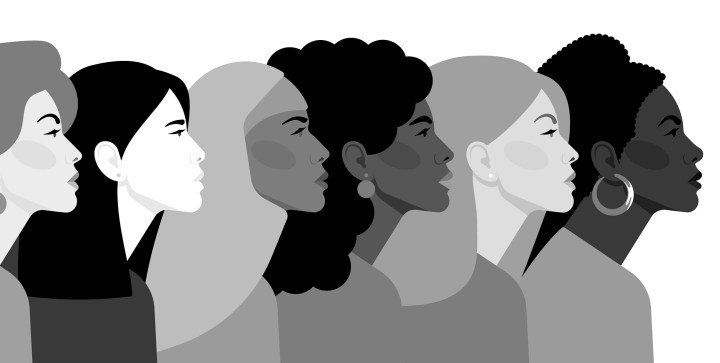
Common challenges experienced by the majority of women in southern Africa oblige us to motivate for gender-sensitive approaches to climate change responses. Governments in particular need to be aware of the particular risks women face, as well as their needs and interests, when devising national development strategies and climate change responses.
The manifestations of climate change are numerous and varied. One of the most noticeable is unpredictable weather patterns. In southern Africa, these have presented as extreme occurrences, such as droughts and floods, hurricanes and cyclones.
While these disasters affect all people living where they arise, they can affect certain demographics in unique ways. This article discusses climate change in the context of women in southern Africa. Women, of course, are not a homogenous group. They have different experiences, challenges and opportunities. These differentiations are influenced by factors such as the countries they live in, the social and cultural fabric of these countries, whether they live in urban or rural areas, their level of education and the extent of their economic emancipation, among others.
However, it is fair to say that there are common challenges experienced by a preponderance of women in southern Africa that inform their typical experience of climate change effects. These oblige us to motivate for gender-sensitive approaches to climate change responses.
There are correlations between gender and social, political and economic outcomes. These correlations have a bearing on women’s experience of climate change effects and their participation in climate change responses.
Literacy and education challenges
Firstly, women in sub-Saharan Africa tend to suffer from lower rates of literacy and education than their male counterparts. This is due to their compromised access to educational institutions. According to the United Nations Educational, Scientific and Cultural Organization twice as many boys as girls will have opportunities to study. This may be the result of, among others, the continued prevalence of early childhood (especially female) marriage, and discriminatory leanings to educate the boy child rather than the girl child should family resources not be adequate to educate both.
Ultimately, these gender disparities mean that women tend to be challenged in accessing and processing information about climate change. This includes their understanding of it and their ability to equip themselves to mitigate and adapt to its effects. This impairment further affects their ability to participate in dialogues on climate change and have their voices heard in proposals on solutions.
As a result, their views are often omitted in discussions on climate responses and their perspectives excluded from policies and programmes.
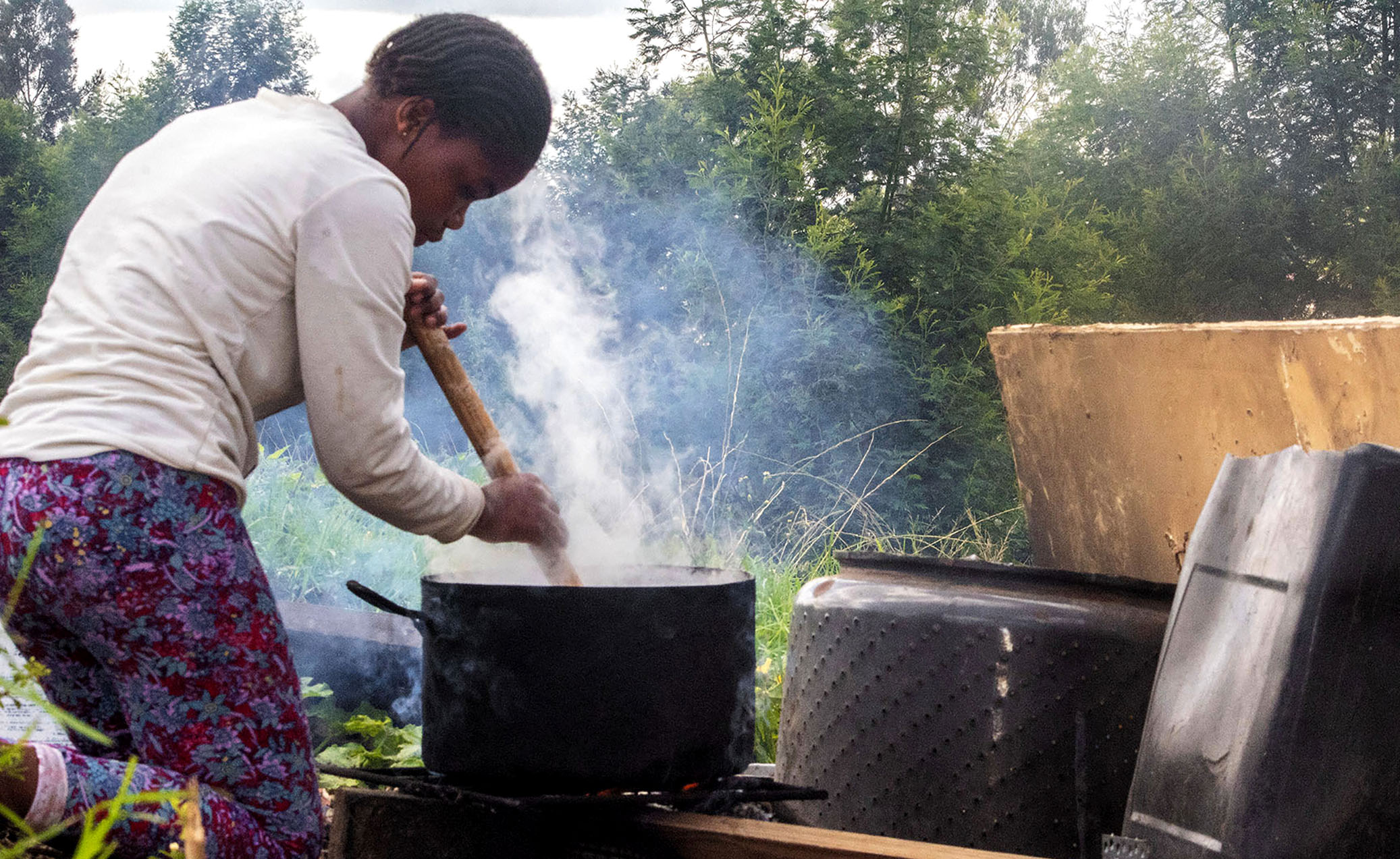
Siwaphiwe Tafeni (19) preparing a meal for her family, she dropped out of school in grade 10 in June 2019 due to her family situation, poverty and school fees issues, in Mthatha in the Eastern Cape. (Photo: Hoseya Jubase)
Farming for survival
A second example of a climate change-related correlation is in employment. It has been reported that “in 2022, the female unemployment rate in the region of southern Africa stood at around 34 per cent. The rate among men was lower, at 30.7 percent. The projection for 2023 showed a similar trend.”
Women’s diminished access to employment opportunities may drive them to participate in subsistence agriculture to feed themselves and their families. This type of agriculture is heavily dependent on weather conditions. Climate change has led to negative effects, such as groundwater depreciation and declining soil fertility. These have led to lower agricultural yields and, hence, escalating food insecurity.
This affects women most, not only because they are heavily involved in climate-reliant subsistence agriculture but also because they are culturally seen as being primarily responsible for household consumption. With climate impacts leading to less agricultural productivity and higher food prices, women are at a growing risk of hunger and malnutrition.
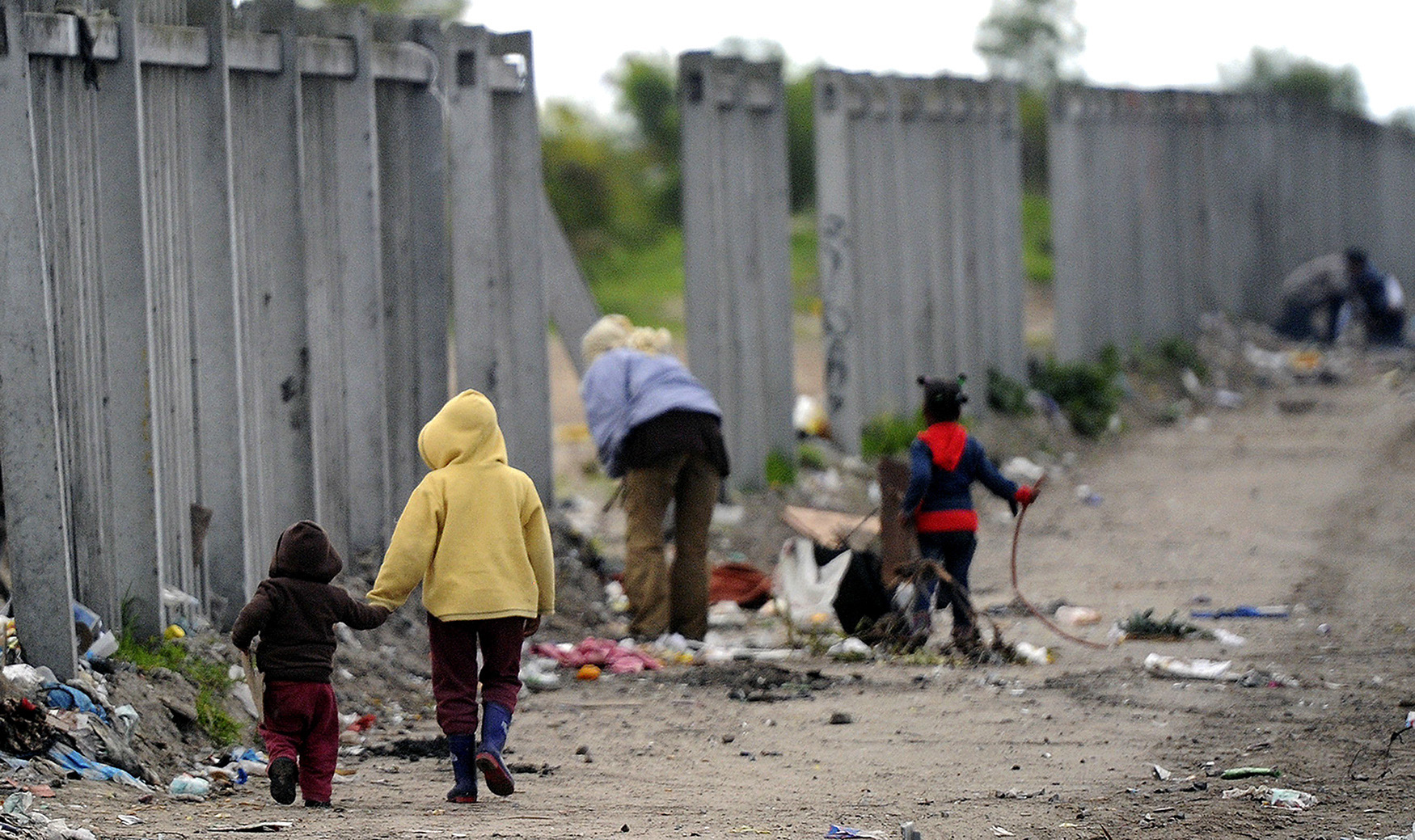
Hunger is linked to many societal challenges chief amongst them being poverty and unemployment. (Photo: Gallo Images / Brenton Geach)
Migration and displacement
Thirdly, the systemic impacts of climate change may lead to climate-related migration and displacement.
The United Nations High Commissioner for Refugees reports that in 2022 “there were 398,000 people who were displaced internally by natural disasters and due to the impacts of climate change”. As climate refugees women are at heightened risk of rape and violence. The southern African region is already prone to high levels of gender-based violence (GBV), even under “normal” circumstances.
Read more in Daily Maverick: Gender inequality forcing African women to bear brunt of climate change storm
During catastrophes such as climate-related displacement rates of GBV can increase. Women who are displaced and left without familial and community protection become particularly vulnerable.
Even following the cessation of climate disasters, when women attempt to go back to their lives and sources of livelihood they may find that these no longer exist. The infrastructure and private property they relied on may have been destroyed. This situation leaves them desperate for survival and prone to exploitation and trafficking.
Lack of political power
Fourthly, women tend to wield little political power in comparison to men. This is so whether at community, national or regional level. Female political participation in national governance is low. UN Women reports that in 2023 only 25.37% of elected seats are held by women in sub-Saharan Africa.
Gender aspects may not be taken into consideration in drawing up national policies and strategies, including those on climate responses, because of this lack of representation.
Finally, women’s participation in southern African economies is largely informal or in micro, small or medium enterprises. This typically excludes them from formal sources of finance and may compromise their ability to implement climate adaptation strategies for their businesses or to conform to climate change legislation, whether in their domestic market or export markets. This can cause them to lose access to important markets for their goods.
These examples highlight the imperative for gender mainstreaming in approaches to climate changes. Governments need to be aware of the particular risks women face as well as of their needs and interests when devising national development strategies and climate change responses.
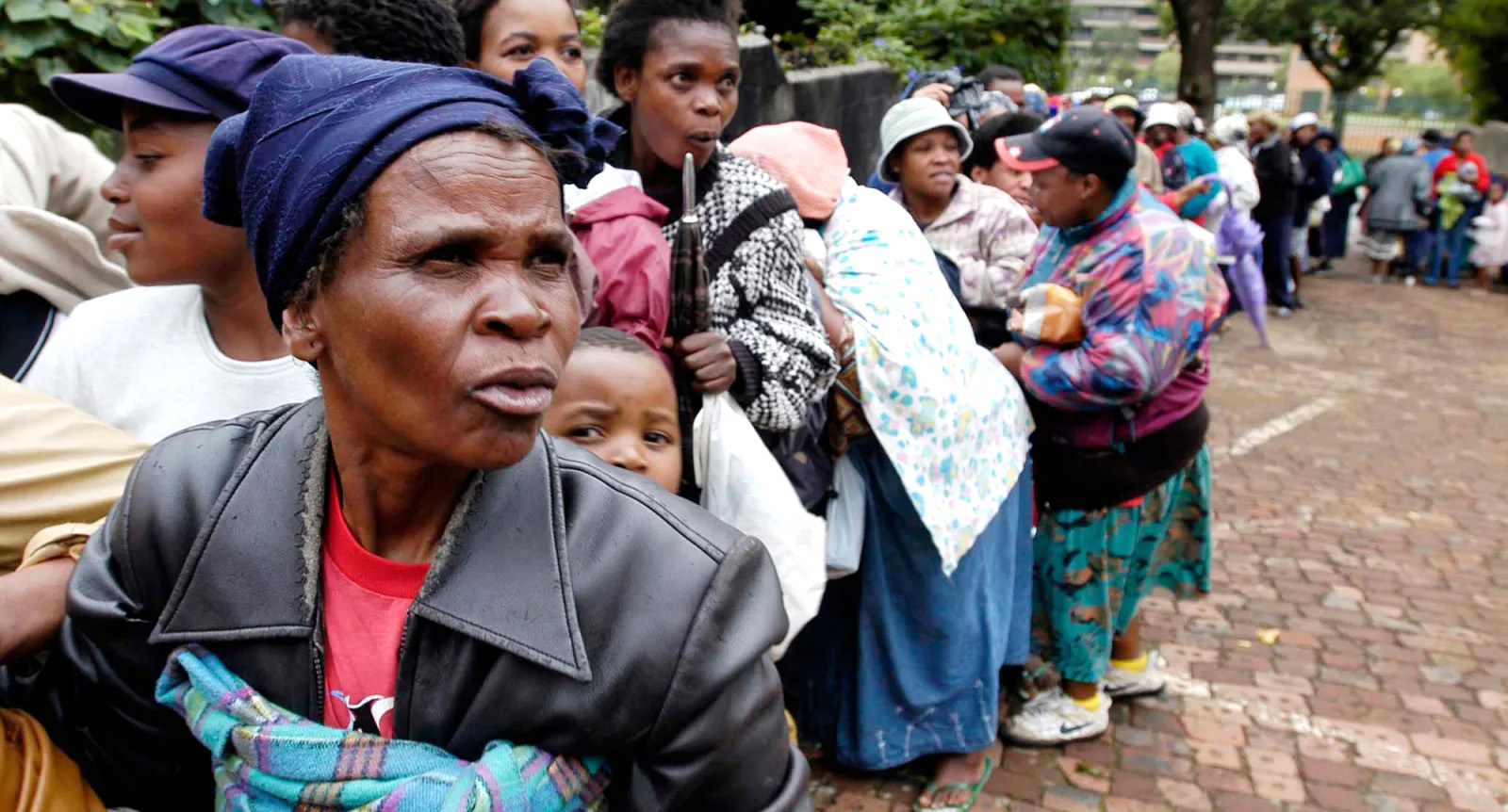
Unemployed women queue for work in Hillbrow, Johannesburg. (Photo: Naashon Zalk / Bloomberg via Getty Images)
Long road to make the connection
The United Nations Framework Convention on Climate Change of 1994 is the foundational multilateral agreement on protecting the climate system. However, it did not take cognisance of the link between gender and climate change. This was an unfortunate omission. However, in subsequent meetings of the Conference of the Parties (COP) members began discussing and recognising the importance of gender dimensions in climate change responses.
The first pronouncement on this was during COP16 held in Cancun, Mexico in 2010. Members adopted Decision 23/CP.16: Matters relating to Article 6 of the Convention, which called for the integration of gender considerations in the formulation and implementation of national adaptation plans.
Finally, the fact that women experience climate change in unique ways was recognised. Parties committed to remaining cognisant of this as they developed their responses, in order to be relevant to the lived experiences of women.
Subsequent headway was also made at COP21, held in Paris, France in 2015. Parties moved from a decision on gender and climate change to a treaty, namely the Paris Agreement. It is a legally binding international instrument that contains actionable rights and obligations for those states that ratify it.
Its preamble recognises the importance of the promotion of gender equality and the empowerment of women in actions taken against climate change. Substantive provisions in Articles 7 (on adaptation) and Article 11 (on capacity-building) both mention the need for gender responsiveness.
Some progress
Three years later, other strides were made at COP 25 in Madrid, Spain.
The parties agreed to a five-year programme (the Lima Work Programme on Gender) and the Gender Action Plan. The importance of plans and programmes is that they outline goals and also provide modalities for their attainment, including those on monitoring and evaluating progress.
The implementation of the Gender Action Plan was reviewed at COP27 (held in Sharm El Sheikh, Egypt in 2022). Amendments to the plan were proposed (Decision 24/CP.27). Some of the concerns raised in the review were the need to scale up support to developing countries to implement the Paris Treaty and the Gender Action Plan. The review reiterates that more must be done to promote gender balance and improve inclusivity.
On the regional front, the members of the Southern African Development Community have agreed on a Protocol on Environmental Management for Sustainable Development. Article 12 of the protocol mandates members to develop legislative and administrative environmental measures that take cognisance of gender-differentiated levels of vulnerabilities.
The region’s Climate Change Strategy and Action Plan (2015) also takes cognisance of the need to devise adaptation strategies which account for the “diverse and gender-differentiated levels of vulnerabilities” in the region.
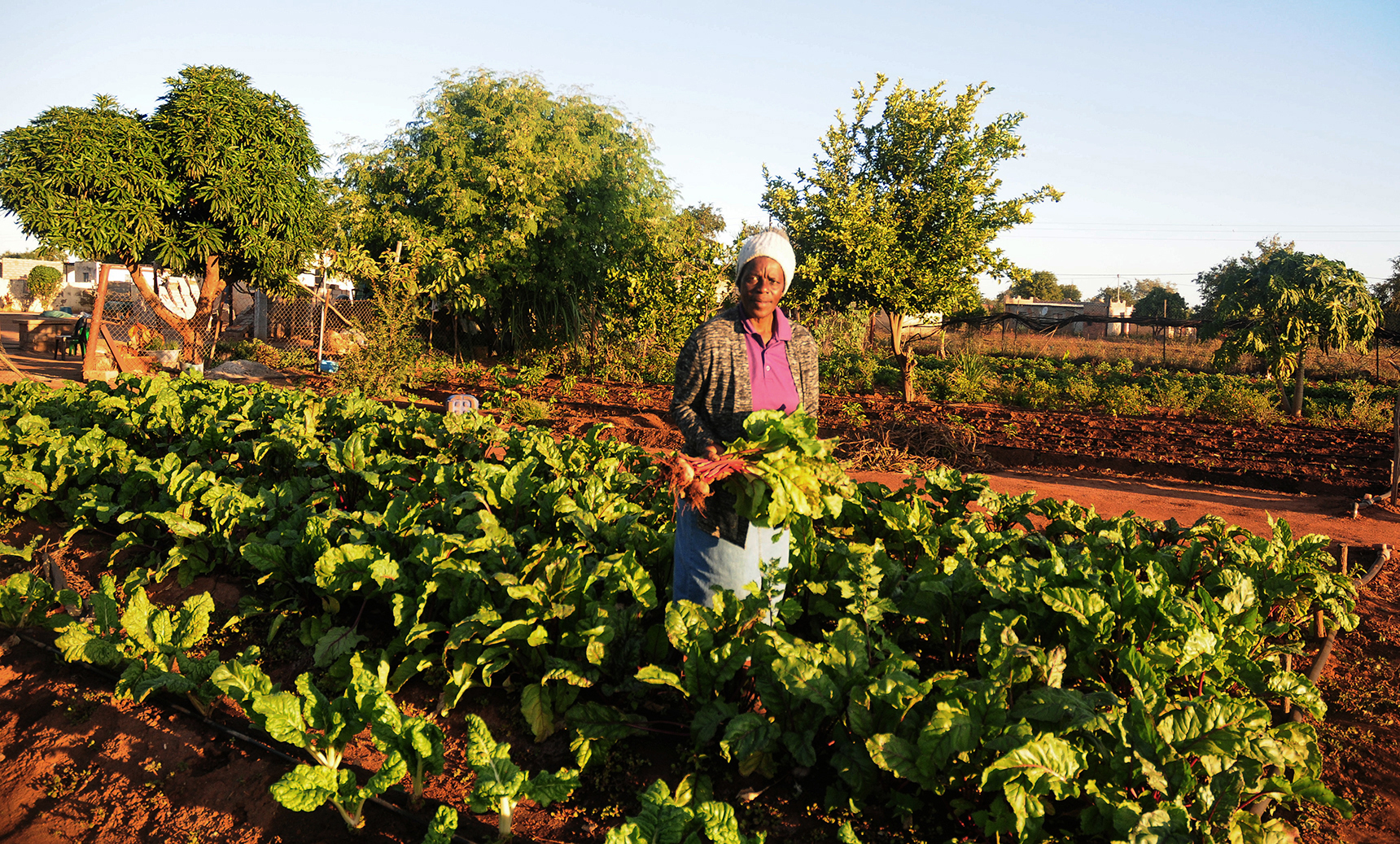
Tintswalo Malina Rikhotso started gardening on a small scale but has now grown to become a major supplier of vegetables in Makhuva village, Limpopo. (Photo: Lucas Ledwaba / Mukurukuru Media)
Some governments mainstream, others don’t
At national level, there is evidence that southern African governments do recognise gender dimensions in their national policies and strategies — although there are variations in the extent of this. For example, Mozambique (2014) and Zimbabwe (2023) have national climate change and gender action plans.
Other states such as Botswana, Namibia and South Africa don’t have such standalone plans, but do mainstream gender in their climate action strategies in recognition of gender perspectives in the context of climate change. The South African National Climate Change Response Policy and the country’s National Climate Change Adaptation Strategy both address gender issues in climate change responses — whether through mitigation or adaptation.
These global, regional and national trends are admirable and build confidence that governments are heading in the right direction in mainstreaming gender into climate change responses.
In conclusion
There is a need to continually investigate and report on the differentiated impacts of climate change on women and men. Further, to consider, devise and implement responses with these considerations in mind so that both women and men are equally protected and uplifted by interventions.
Women must be afforded protection from hazards arising from adverse climatic changes and must be uplifted by interventionist responses, whether economically, socially or otherwise. Particular attention should be accorded women who are part of vulnerable communities, such as those based in rural locations or who are part of ethnic minorities, or who are living with disabilities.
It is worth remembering that both gender and climate change are components of the United Nations Sustainable Development Goals (SDG 5 and SDG 13, respectively).
We must not lose sight of their correlation and contribution to the achievement of sustainable development. DM
This is the fifth article in a series on climate change and development in Africa presented by the Nelson Mandela School of Public Governance at UCT. In the context of COP-28, taking place in the United Arab Emirates, it aims to assist readers in understanding the nuances of the debate on how to respond to the systemic impacts of climate change.
Read part one here : A much larger transformation in Africa — why a just transition must be complemented by climate-resilient development
Read part two here: https://www.dailymaverick.co.za/article/2023-12-01-conflicting-visions-on-just-transition-to-low-carbon-economy-cloud-critical-climate-change-negotiations/
Read part three here: https://www.dailymaverick.co.za/article/2023-12-04-making-the-most-of-africas-critical-minerals-in-just-transition-to-green-and-renewable-energy-sources/
Read part four here: https://www.dailymaverick.co.za/article/2023-12-05-food-systems-transformation-features-prominently-in-the-agenda-of-cop28/
Tsotang Tsietsi is a senior research associate at the Nelson Mandela School of Public Governance at the University of Cape Town.
In the lead-up to this year’s Conference of the Parties to the UN Framework Convention on Climate Change (known as COP28) this series on climate change and development in Africa presented by the Nelson Mandela School of Public Governance aims to assist readers in understanding the nuances of the debate on how to respond to the systemic impacts of climate change.



















Really!?
Hahahahahaha